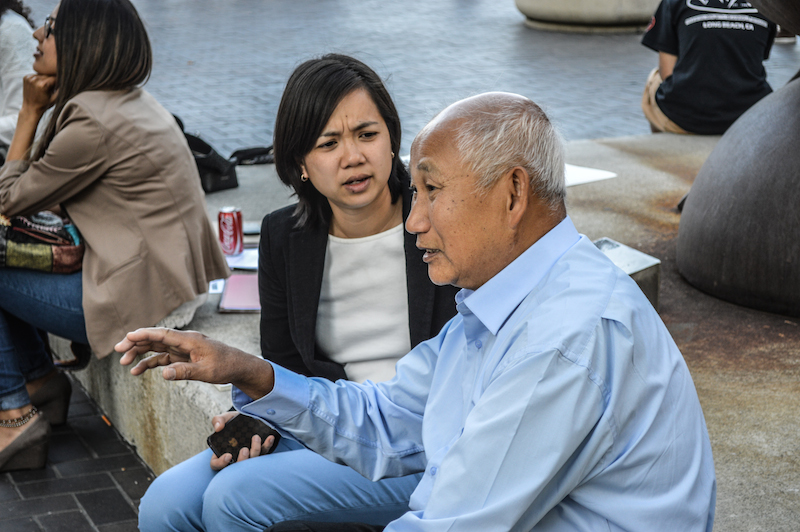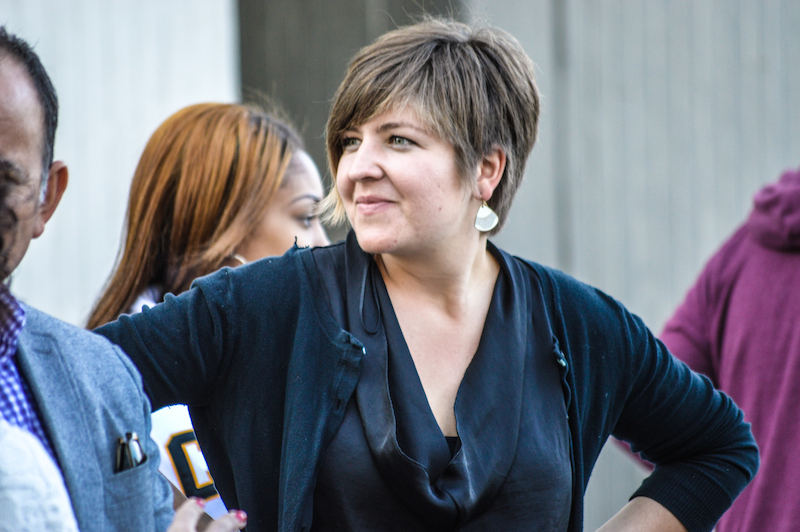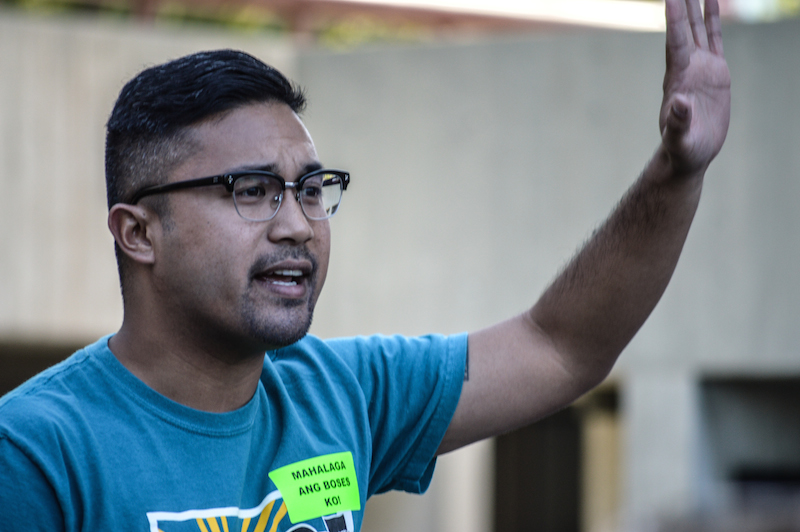
Two Khmer speakers discuss the importance of language access. Photos by Brian Addison.
A consortium of local advocacy groups gathered in front of City Hall yesterday shortly before the council meeting in order to further address the need for language access throughout the city.
The rally, held before multiple citizens from a variety of backgrounds spoke directly to the Council, follows the Council’s approval last August of a city-wide Language Access Policy (LAP). However, the $500K+ program—set to be funded and implemented last year—has not been implemented in accordance with the Council’s direction.
 “What the City had agreed to do was to basically implement a series of programs and protocols to expand access,” said Laura Merryfield [pictured], Parent Education Organizer for Building Healthy Communities Long Beach. “We don’t ask that we have quatrilingual people at every front desk but that we know where they are. Having vital documents in multiple languages. Not using children as interpreters. These are basic necessities.”
“What the City had agreed to do was to basically implement a series of programs and protocols to expand access,” said Laura Merryfield [pictured], Parent Education Organizer for Building Healthy Communities Long Beach. “We don’t ask that we have quatrilingual people at every front desk but that we know where they are. Having vital documents in multiple languages. Not using children as interpreters. These are basic necessities.”
Given that Long Beach is home to over 62,000 Spanish speakers and over 13,500 Khmer and Tagalog speakers, the fact that the LAP has not been properly implemented is a red flag for those who were at the rally.
According to the most recent compliance report as well as research conducted by the Long Beach Language Access Coalition (LBLAC), to date, no vital documents have been translated nor has there been any formal plans to improve translation training.
Even more, the LBLAC conducted 110 tests via walk-ins or calls by residents to the Health Department, Utilities Department, Housing Authority, or Neighborhood Services. More than half of those calls were not connected with a bilingual staffer, with some even being hung up on after being informed that no one spoke their language.

“Back in August, we were very happy—and for obvious reasons: our council passed a very progressive policy,” Merryfield said. “Now with where we’re at, our advocacy is about making the details that were supposed to happen actually happen.”
Multiple people spoke, essentially directing the council to take the following recommendations:
– Implement and fund the previously approved LAP;
– Include Spanish, Khmer, and Tagalog on all voicemails;
– Train staff on how to speak to LEP residents and how to work with interpreters;
– Translate vital documents into Spanish, Khmer, and Tagalog;
– Create a plan for bi-lingual hiring goals;
– Use the Language Line Pilot program to help access for all language, not just Spanish, Khmer, and Tagalog;
– Allocate formal funding to implement the LAP;
– Set a timeline for compliance hearings.
 9th District Councilmember Steve Neal put forth a substitution motion to have vital documents translated as well as looking at the viability of voicemail on mainline departments translated. He asked City staff to return in July of this year to report back on the cost and implementation of these actions.
9th District Councilmember Steve Neal put forth a substitution motion to have vital documents translated as well as looking at the viability of voicemail on mainline departments translated. He asked City staff to return in July of this year to report back on the cost and implementation of these actions.
The motion was unanimously approved.
Read more:
- Comprehensive Language Access Policy Passes Council
- OP-ED: City’s Long Awaited Comprehensive Language Policy Falls Short
{FG_GEOMAP [33.7680362,-118.19563870000002] FG_GEOMAP}

